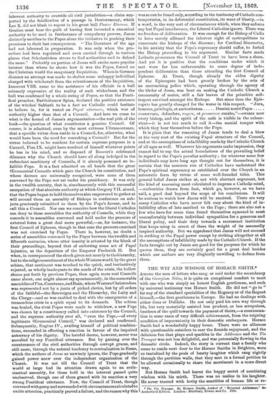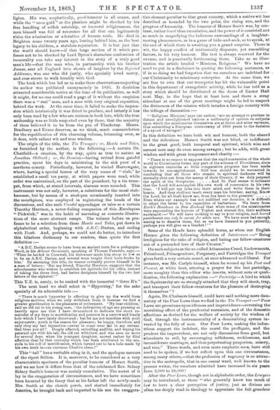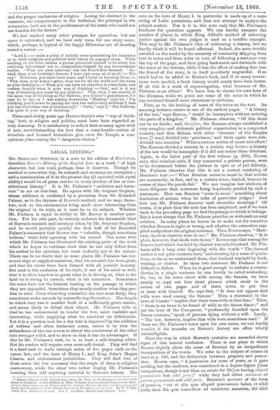THE WIT AND WISDOM OF HORACE SMITH.* AMONG the men
of letters who sang or said under the ascendancy of the Georgium Sidus, it is quite an exceptional comfort to meet with one who was simply an honest English gentleman, and such by universal testimony was Horace Smith. He did not "go in" for any of the standard specialities of the Regency or of the Regent himself,—the first gentleman in Europe. He had no dealings with either duns or Dalilahs. He not only paid his own way through life, but very materially assisted less prudent, or less scrupulous, brethren of the quill towards the payment of theirs,—a consumma- tion in some cases of very difficult achievement, from the reigning condition of impecuniosity in their domestic exchequers. Horace Smith had a wonderfully happy home. There were no alliances with questionable outsiders to mar the fireside enjoyment, and the delicious fun that plays and sparkles in the Addresses and the Tin Trumpet was not less delightful, and was perennially flowing in the domestic circle. Indeed, the story is current that a family who came to reside next door to the Horace Smiths in Brighton, were so tantalized by the peals of hearty laughter which rang nightly through the partition walls, that they sent in a formal petition to be allowed occasionally to share the merriment in a more direct way.
But Horace Smith had learnt the happy secret of combining wisdom with his mirth. There was no malice in his laughter. He never treated with levity the sanctities of human life or re-
* The Tii Teumpee. By Horace Smith, Author of "Rejected Addressee," ifc. Authorized Edition. London : Bradbury, Evans, and Co. 1869.
ligion. His was, emphatically, good-humour in all senses, and while the " unco guid " or the pharisee might be shocked by his free handling of selfish saiutship, or immoral religiousness, the man himself was full of reverence for all that can legitimately claim the admiration or adoration of human souls. He died in Brighton some twenty years ago, leaving behind him, as the best legacy to his children, a stainless reputation. It is but just that the world should know—if that large section of it which pro- fesses not to be shocked by Lord Byron's shameless confessions of immorality can take any interest in the story of a truly good man's life—that the man who, in partnership with his brother James, sent all England into shouts of laughter by the Rejected Addresses, was one who did justly, who specially loved mercy, and ever strove to walk humbly with God.
The book which has led us to make these observations respecting its author was published anonymously in 1836. It doubtless attracted considerable notice at the time of its publication, as well it might, for no one could read a page of it without the suspicion there was a " real " man, and a man with very original capacities, behind the work. At the same time, it failed to make the impres- sion which intrinsically it was fitted to produce, and latterly it has only been read by a few who are curious in book lore, while the true authorship was so little suspected even by these, that the majority of them believed it to be from the pen of Thackeray. Messrs. Bradbury and Evans deserves, as we think, much commendation for the republication of this charming volume, brimming over, as it does, with salient wit and true wisdom.
The origin of the title, the Tin Trumpet; or, Heads and Tales, as furnished by the author, is the following :—A certain Dr. Chatfield—a creation, by the way, quite as true to nature as Jonathan Oldbuck ; or, the Dominie—having retired from gainful practice, anent his days in ministering to the sick poor of a northern county. Periodically, however, he visited Harrowgate, where, having a special horror of the very name of "club," he established a small tea party, at which papers were read, while order was maintained, on the part of the president, by a tin trum- pet, from which, at stated intervals, alarums were sounded. This instrument was not only, however, a substitute for the usual club- hammer, but by means of a steel-pen occasionally inserted into the mouthpiece, was employed in registering the heads of the discussions, and also such Caudal appendages or tales as a certain Timothy Harrison, a never-failing companion of this lEsculapian "Pickwick," was in the habit of narrating as concrete illustra- tions of the more abstract essays. The volume before us pro- fesses to be a selection from these Heads and Tales, put down in alphabetical order, beginning with A.B.C.-Darian, and ending with Youth. And, perhaps, we could not do better, to introduce this hilarious dictionary to our readers, than quote the first definition :—
"A.B.O. Darien seems to have been an ancient term for a pedagogue. Wood, in his Athence Oxoniensis, speaking of Thomas Farnsbie, says :- 'When he landed in Cornwall, his distresses made him stoop so low as to be an A.B.C. Darien, and several wore taught their horn-books by him.' By assuming this title, its wearer certainly proves himself to be a man of letters : But my friend, Timothy Harrison, suggests that the schoolmaster who wishes to establish his aptitude for his office, instead of taking the three first, had better designate himself by the two last letters of the alphabet.'"
This Y.Z. is, surely, to be ranked with the immortal "three R's." The next head we shall select is "Hypocrisy," for the sake specially of its admirable tale :—
" There is much hypocrisy in affecting to give up the world from religious motives, when we only withdraw from it because we find a greater gratification in the pleasures of retirement. 'My dear children,' said an old rat to his young ones, 'the infirmities of age are pressing so heavily upon me that I have determined to dedicate the short re- mainder of my days to mortification and penance in a narrow and lonely hole which I have lately discovered ; but let sue not interfere with your enjoyments; youth is the season for pleasure ; be happy, therefore, and only obey my last injunction—never to come near lee in my retreat. God bless you all !' Deeply affected, snivelling audibly, and wiping his paternal eye with his tail, the old rat withdrew, and was seen no more for several days, when his youngest daughter, moved rather by filial affection than by that curiosity which has been attributed to the sex, stole to his cell of mortification, which turned out to be a hole made by his own teeth in—an enormous Cheshire cheese!"
This" tail" has a veritable sting in it, and the apologue savours of the ripest Stilton. It is, moreover, to be considered as a very characteristic specimen of the peculiar humour of Horace Smith, and we see how it differs from that of the celebrated Rev. Sidney Sidney Smith's humour was mainly cumulative. The secret of it lay in the exaggeration of circumstances, and we have sometimes been haunted by the fancy that as his father left the newly-made Mrs. Smith at the church porch, and started immediately for America, he brought back and imparted to his son the exaggera- tive element peculiar to that great country, which a native wit has described as bounded by the two poles, the rising sun, and the progress of humanity. The humour of Horace Smith was, by con- trast, rather lineal than cumulative, and the power of it consisted not so much in magnifying the ludicrous surroundings of a laughter- moving phenomenon, as in a game of hide-and-seek, so to speak, at the end of which there is awaiting you a grand surprise. There is wit, the happy conflict of intrinsically disparate, yet resembling factors, in his very humour. His trot is always reserved for the avenue, and is punctually forthcoming there. Take as an illus. tration the article headed "Missions, Religious." We have no need to put in a disclaimer in quoting the following sentences, as if in so doing we had forgotten that we ourselves are indebted for . our Christianity to missionary enterprise. At the same time, we are free to own that our trumpeter has bit the vulnerable point in this department of evangelistic activity, while he has told us a story which should be distributed at the doors of Exeter Hall next May, in the hope that at least here and there a stray attendant at one of the great meetings might be led to suspect the divineness of the mission which invades a foreign country with the tidings of damnation :—
" Religious Missions,' says our author, are an attempt to produce in distant and unenlightened nations a uniformity of opinion on subjects upon which the missionaries themselves are at fierce and utter variance, thus submitting a European controversy of 1800 years to the decision of a synod of savages ! "
In this definition we have both wit and humour, both the absurd and the ridiculous. IIorace Smith was not blind, or indifferent to the great good, both temporal and spiritual, which wise and earnest men may do even among savages ; but he adds, with great wisdom and with great temperance and charity :—
"There is no reason to suppose that the rapid conversion of the whole world to Christianity forms any part of the scheme of Providence, since in eighteen centuries so little comparative progress has been made towards its accomplishment. Still less should we be warranted in concluding that all those who remain in spiritual darkness will be eternally shut out from the mercy of their Creator, if we duly perpend
the spirit of the Scriptures And St. Paul seems to intimate that the Lord will accomplish His own work of conversion in his own
time. will put my laws into their mind, and write them in their hearts. And they shall not teach every man his brother, saying, Know the Lord, for all shall know me, from the least to the greatest.' . . . . . Even where our example has not nullified our doctrine, it is difficult to adapt the latter to the capacities of barbarians. We learn from Earle's Residence in New Zealand that when some of the missionaries were expounding the horrors of Tophet and eternal fire, their auditors exclaimed :—' We will have nothing to say to your religion, such horrid punishments can only be meant for white men. We have none bad enough among us to deserve them, but as we have listened to you patiently, perhaps you will give us a blanket !
Some of the Heads have splendid horns, as when our English Horace gives the following definition of Intolerance :—" Being irreligious for the sake of religion, and hating our fellow-creatures out of a pretended love of their Creator."
On such subjects as the so-called Athanasian Creed, Endowments, Priesthood, Primogeniture, Purgatory, and Partridges the Trumpet gives forth a very certain sound, at once advanced and liberal. For instance, was Mr. Carlyle himself, when he wound up his Past an Present, at white heat, uttering a prayer for the last partridge, more naughty than this editor who inserts, without note or quali- fication, the following explanation :—" Partridge—A bird to which the Squirearchy are so strongly attached that they will shoot, trap, and transport their fellow-creatures for the pleasure of destroying it themselves " ?
Again, Dr. Chalmers himself, could have said nothing more dam- natory of the Poor Laws than we find in the Tin Trumpet :—" Poor Laws are premiums upon idleness and improvidence—reversing the- moralizing effect of the prudential restraints, and of the domeeti affections as devised for the welfare of society by the wisdom of God, through the instrumentality of a demoralizing system in- vented by the folly of men. Our Poor Laws, making the indus- trious support the indolent, the moral the profligate, and the- prudent the improvident, are not only dissuasions from good, but stimulants to evil, by encouraging selfishness, recklessness, and inconsiderate marriages, and thus perpetuating pauperism, misery,. and vice." These words, and even more emphatic ones, have still need to be spoken, if we but reflect upon this one circumstance, among many others,—that the profession of vagrancy is so :attrac- tive in the metropolis, that in one casual ward, well known to the present writer, the numbers admitted have increased in six years from 2,000 to 18,000!
After the Poor Laws, though not in alphabetic order, the Lawyers
-
may be introduced, as those "who generally know too much of law to have a clear perception of justice, just as divines are often too deeply read in theology to appreciate the full grandeur and the proper tendencies of religion. Losing the abstract in the concrete, the comprehensive in the technical, the principal in the accessories, both are in the predicament of the rustic who could not see Loudon for the houses."
We had marked many other passages for quotation, but our space is exhausted, and we have only room for one story more, which, perhaps, is typical of the happy Hibernian art of shooting round a corner :-
"Lord L— made a point of strictly cross-questioning his domestics as to their religions and political faith before he engaged them. While residing on his Irish estates a groom presented himself to be hired, but resolving beforehand not to compromise himself by any inconsiderate replies. What are your opinions,' was the Peer's first demand. 'In-
deed, then, your lordship's honour, I have just none, at all at Not any ! Nonsense, you must have some, and I insist on knowing them?— ' Why, then, your honor's glory, they are for all the world just the same as your lordship's.'—' Then you can have no objection to state them, and confess frankly what is your way of thinking.'—' Och! and is it my way of thinking you mane by my opinions ? Why, then, I am exactly of the same way of thinking as Pat Sullivan, you honour's gamekeeper, for says he to me, as I was coming downstairs, "Murphy," says he, "I'm thinking you'll never be paying me that two and-twenty-shillings I lent you last Christmas was a twelvemonth." "Faith," says I, "Pat Sullivan, Pm quite of your way of thinking.'"
Three-and-thirty years ago Horace Smith's own "way of think- ing," both in religion and politics, must have been regarded as very alarming. It is satisfactory to reflect that so many agree with it now, notwithstanding the fact that a considerable section of ritualists and licensed victuallers give even Dr. Temple a con- spicuous place among the "dangerous classes."




































 Previous page
Previous page